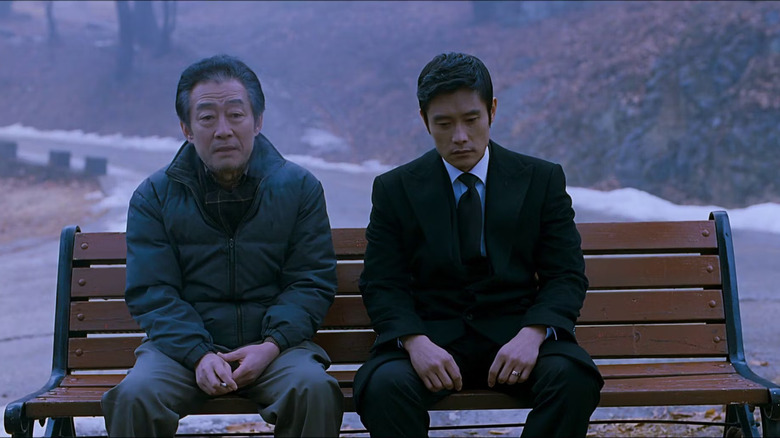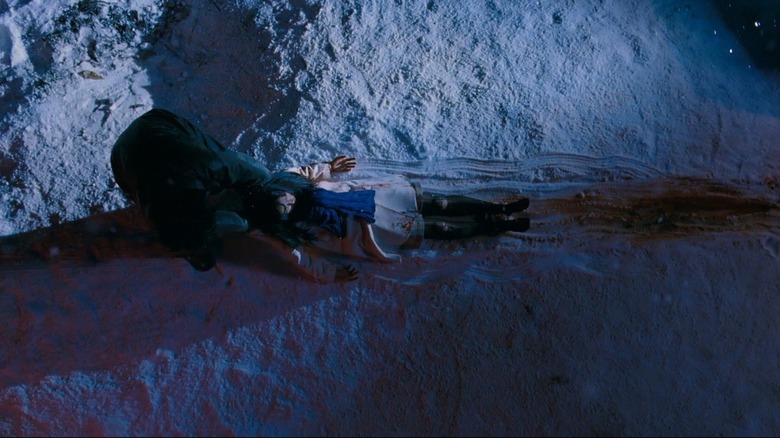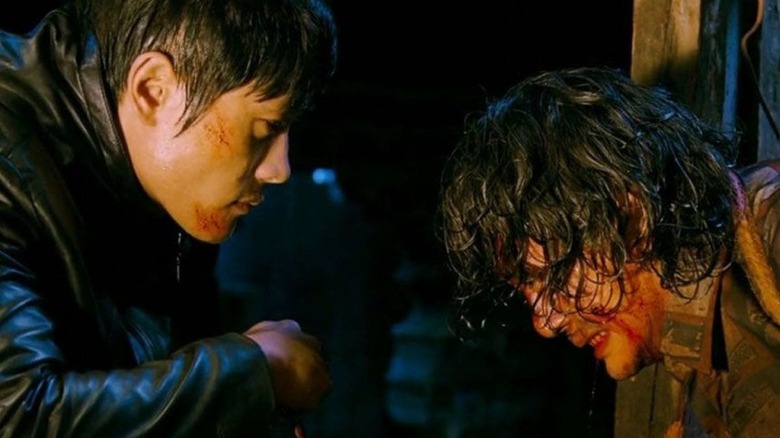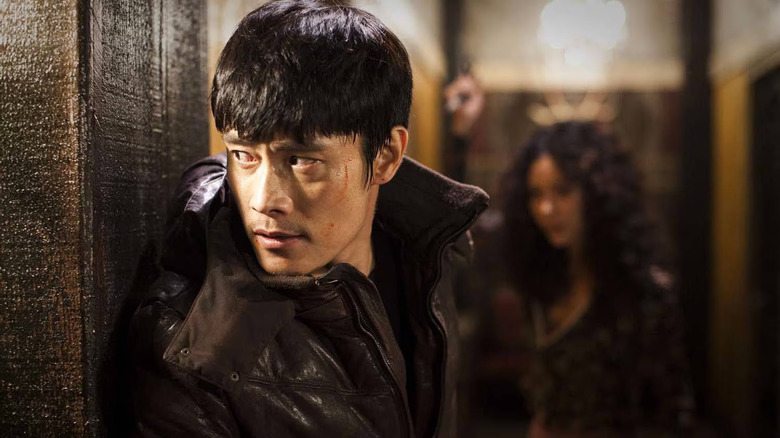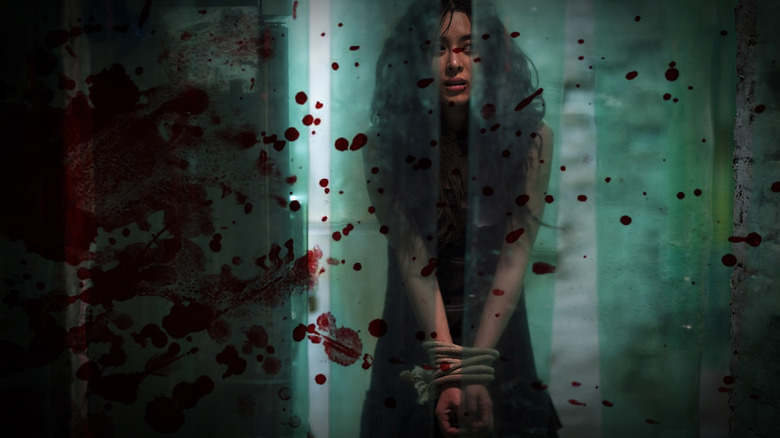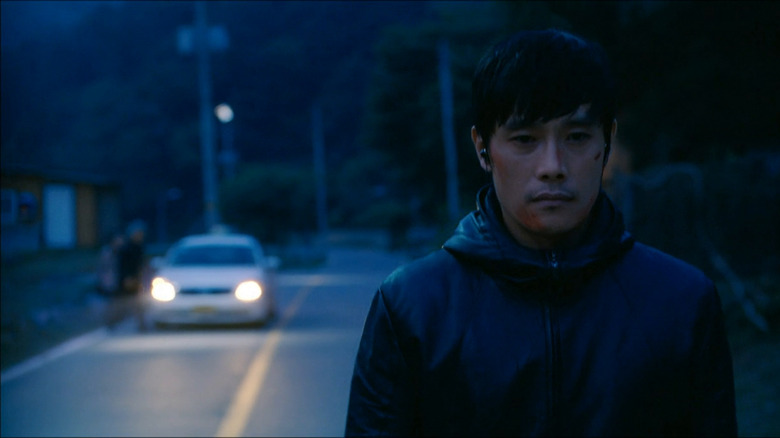I Saw The Devil Ending Explained: A Case Against Vengeance
What would you do if a monster took your loved ones from you? Some might not like to admit it, but pre-emptive fantasies of retribution have a cathartic quality, giving us a sense that we could take control of the narrative in a dreaded scenario. Perhaps this is why revenge thrillers are so popular. They allow us to vicariously live out such fantasies while also taking a moral standpoint, as most of us know that we would never act upon these dark reveries. It is queasily satisfying watching scumbags and murderers getting their comeuppance, even if a film ultimately comes down on the side of "vigilantism is bad."
Most of us like to think we are good and moral people and we know that taking the law into our own hands is fundamentally wrong. Not all such movies arrive at that conclusion. When "Death Wish" was released in 1974, it was widely criticized for promoting vigilante justice, but Michael Winner's cynical film struck a chord with audiences when violent crime was on the increase in the U.S. Three years earlier, "Dirty Harry" posed an unsettling question: If our child was suffocating in a hole somewhere, put there by a sadistic killer, might we place our morals on the back burner if a renegade cop literally stomping on the rights of the suspect could find out the location?
The majority of revenge thrillers are morality tales, warning us of the dark path that lies ahead for anyone who pursues violent retribution. Korean cinema has had a strong line in the genre, bringing us to "I Saw the Devil," a bleak and brutal film that stress tests those moral boundaries to the limit.
The setup
"I Saw the Devil" begins on a quiet snowy night as a young woman, Jang Joo-yun (Oh San-ha), gets a flat tire on an isolated stretch of road. She is approached by the driver of a school bus, Jang Kyung-chul (Choi Min-sik), who offers assistance. She wisely refuses but he breaks into her car, bludgeons her, and takes her back to his grisly lair to dismember her. Before she dies, she reveals that she is pregnant and pleads for her life.
Joo-yun's body parts are soon discovered in a stream. Her father, Squad Chief Jang (Jeon Gook-hwan), and her devastated fiancé, National Intelligence agent Kim Soo-hyun (Lee Byung-hun), are present at the crime scene. Stricken with guilt for not being there to protect her, Soo-hyun vows revenge on her killer.
Soo-hyun quickly whittles down the list of suspects to Kyung-chul. He visits the suspect's estranged parents and abandoned son to obtain contact details and heads out to the murderer's ramshackle home. He finds Joo-yun's engagement ring in the drain of the torture chamber, proving that the bus driver is her killer.
Tracking down Kyung-chul, Soo-hyun interrupts him as he is about to sexually assault and murder a schoolgirl. After a furious fight, Soo-hyun beats the suspect unconscious and shoves a tracking device down his throat. The lawman has no intention of taking him in or killing him on the spot. He plans to draw out his revenge to make Kyung-chul's existence a living hell. He releases him and even provides a wad of cash to extend the chase. It's a dangerous game — Kyung-chul is a ferocious and pitiless adversary, and it is even deadlier for the innocent people who are caught in the crossfire.
Becoming a monster to fight a monster
The notion of our protagonist becoming the mirror image of the enemy they seek is a popular one in cinema, to the point of becoming hackneyed. How often have we heard a villain taunt our hero with the old "We're not so different, you and I" spiel? In "I Saw the Devil," director Kim Jee-woon examines this trope through a Nietzschian lens, in relation to the philosopher's famous warning:
"He who fights monsters should see to it that he himself does not become a monster. And if you gaze for long into an abyss, the abyss gazes also into you."
In Jee-woon's film, both protagonist and the antagonist see the devil in the other. Soo-hyun is hellbent on his mission against Kyung-chul's embodiment of evil and loses his moral compass, becoming a monster in the process. Kyung-chul is able to sense wickedness in others and recognizes that his relentless adversary has become tainted by evil, musing at one point that Soo-hyun is a real psycho. In an interview with Electric Sheep, Jee-woon expanded on how the film explores Nietzsche's concept:
"Nietzsche is giving a warning that in order to kill the devil you have to become the devil yourself, and it is exactly this dilemma that I have tried to express in my film. In other words, the film is not about the sadness about the person who dies but it's about the torture for the ones who live and are left behind. Soo-hyun realizes that physical pain is no longer significant and he carries out revenge through psychological violence. And although he knows that what he's doing is morally wrong, it is an inevitable decision on his part."
Kim Soo-hyun's descent
"I Saw the Devil" is a dark and exhausting study of revenge that still provokes strong reactions from viewers over a decade after it was first released. The most divisive issue is Soo-hyun's quest — I've seen some people state they were behind him all the way, while others find his increasingly extreme methods disturbing. Kim Jee-woon's film is deliberately calibrated to make the viewer ask questions about the nature of vengeance. While we may initially sympathize with Soo-hyun and see his desire for revenge as warranted, it becomes harder to root for him as the story unfolds.
Things get tricky because his revenge becomes more about him and his feelings rather than his murdered fiancée and unborn baby. Their death may be the catalyst of Soo-hyun's downward spiral but it is a narcissistic rampage, one that puts a further twist on the initial irony that he was unable to use the powers at his disposal to save his loved ones. As a national security agent, it is Soo-hyun's job to protect people, but that goes out of the window as his drive for vengeance results in several innocent people becoming collateral damage as a consequence of his actions.
By repeatedly releasing Kyung-chul back into the public to keep the game going, a pharmacist gets knifed in the throat, a taxi driver is battered to death, and the killer pays a little visit to Chief Chang and his remaining daughter. This raises the question: Did Soo-hyun price those risks into his plan?
It would be easier to square away Soo-hyun's actions if only the killer suffered, but the film doesn't give us that safety net. By putting others in harm's way, Soo-hyun's extended pursuit is not only self-centered but deeply irresponsible and immoral, beyond the usual boundaries of taking the law into one's own hands.
The endgame
On the run from his pursuer, Kyung-chul seeks shelter with another serial killer pal, Tae-joo (Choi Moo-sung), and his girlfriend Se-jung (Kim In-seo). Tae-joo is even more repellent than Kyung-chul, a cannibal who has apparently gone insane from feasting on the flesh of his victims.
After a bloody showdown at Tae-joo's house that leaves all four combatants hospitalized, Kyung-chul overhears Soo-hyun talking about the tracking device that is still in his guts. When the latter releases his prey once again, the killer heads straight to a pharmacy, loads up on laxatives, and s***s the transmitter out.
Enraged by Soo-hyun's ruthless pursuit, Kyung-chul attempts to wrestle back control of their personal war. He visits the home of Chief Jang, beats him to a pulp, and murders his other daughter. He then tries to hand himself over to the Seoul police to evade Soo-hyun's scheme.
Soo-hyun has other ideas. He daringly snatches Kyung-chul from under the noses of the cops and takes him back to the torture shack, setting him up in the guillotine he has used on his victims. Bloodied and beaten, Kyung-chul taunts his pursuer, claiming that fear has no effect on him. But Soo-hyun has figured out a fiendish way to hit him where it hurts.
Rigging the guillotine so the blade will drop if someone opens the door, he leaves Kyung-chul's home just as a taxi arrives with the killer's parents and son. Listening in on the tracking device that he has left behind, he hears Kyung-chul desperately plead with his family not to enter. They can't hear him properly so they ignore his warnings — the heavy blade falls and beheads him in front of them. Walking away, Soo-hyun weeps for his murdered fiancée and unborn child.
I Saw the Devil ending explained
By using Kyung-chul's family against him, Soo-hyun identifies the last vestige of humanity in the killer and makes sure his final moments are full of anguish. Not only does Kyung-chul know that opening the door will release the death trap, but there is also a sense that he is suddenly filled with panic and shame. He hasn't seen his parents and kid for years and doesn't want them to be the people to discover his crimes, let alone be the ones who unwittingly cause his demise.
The cunning payback releases a great weight of grief and anger for Soo-hyun, but at what cost? People have been horribly injured, sexually assaulted, and murdered thanks to his plan — involving Kyung-chul's family feels like the point where the agent is irrevocably lost. The gruesome coup de grâce will no doubt leave the elderly couple and the young boy with severe psychological damage, becoming further victims of Soo-hyun's plan. For Kim Jee-woon, it was about pushing beyond the "lie" of revenge thrillers (via Electric Sheep):
"Revenge films normally follow the same dramatic structure: you torture the criminal and, in the end, the protagonist gets his or her revenge, and the audience finds some sort of justice in that. But I thought that sort of ending is a lie because the question I kept asking myself was whether it was actually possible to carry out ultimate revenge without destroying yourself. This is what I tried to portray here."
Some critics have written off "I Saw the Devil" as torture porn. While it shares some traits with that subgenre, that is a simplistic misreading of Jee-woon's film. With his protagonist's final ghastly and unjustifiable act, the director underscores his true purpose: I can think of few movies that build such a moral case against vigilante justice and violent revenge.
